2024年中考英语二轮复习语法突破课件:动词的时态(共53张PPT)
文档属性
| 名称 | 2024年中考英语二轮复习语法突破课件:动词的时态(共53张PPT) |  | |
| 格式 | pptx | ||
| 文件大小 | 237.6KB | ||
| 资源类型 | 教案 | ||
| 版本资源 | 通用版 | ||
| 科目 | 英语 | ||
| 更新时间 | 2024-05-13 10:07:01 | ||
图片预览

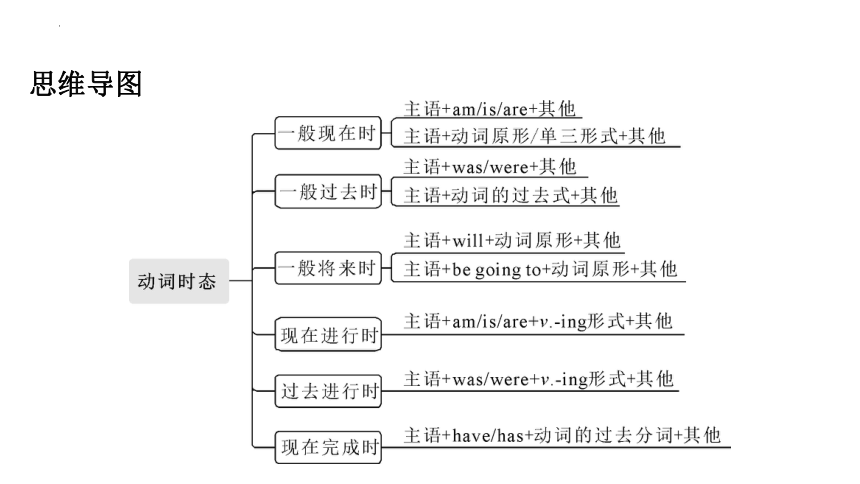

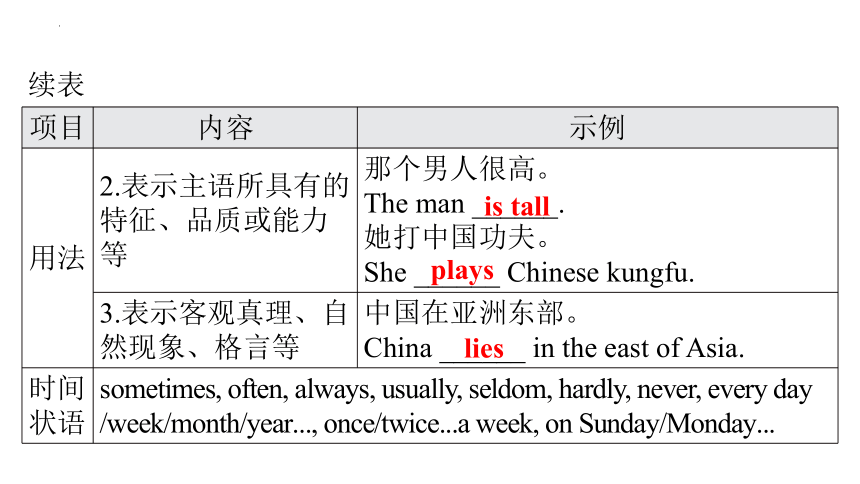
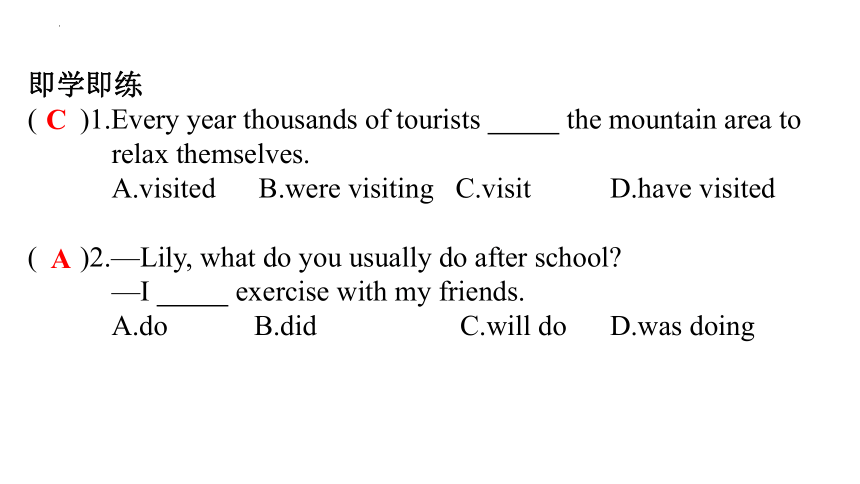
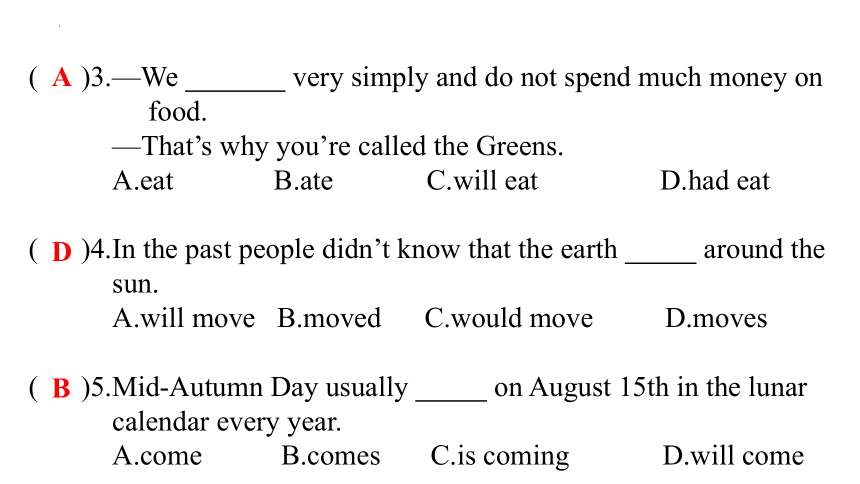
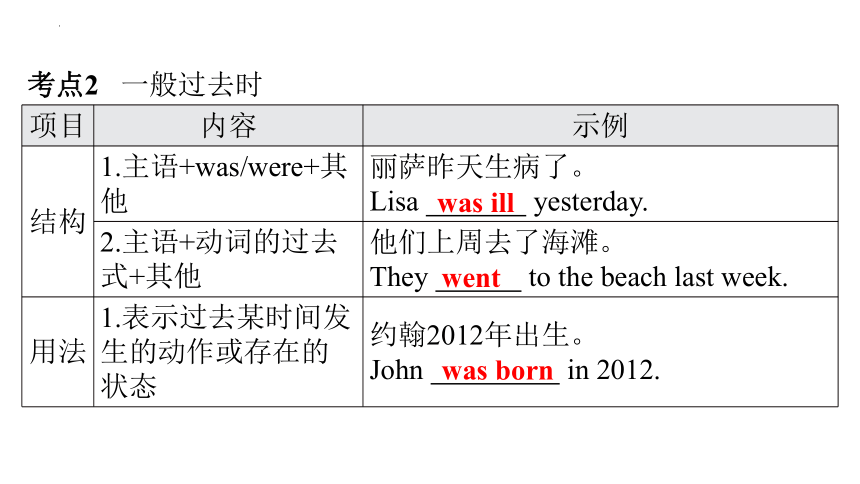
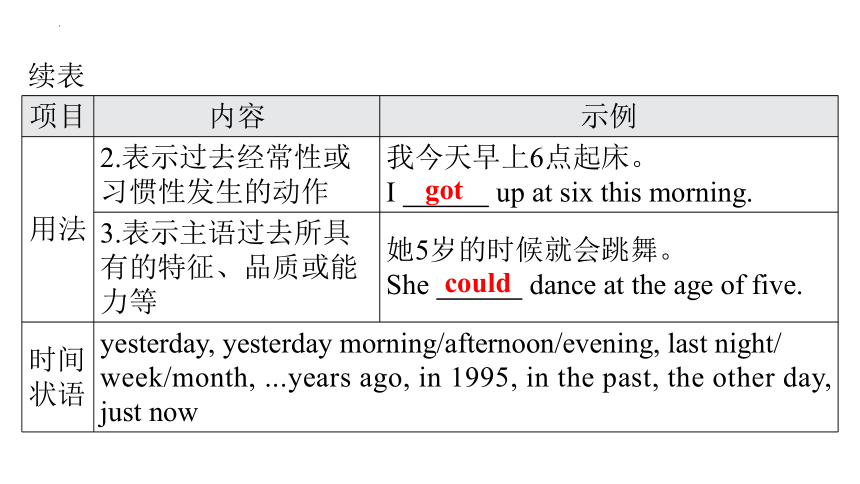
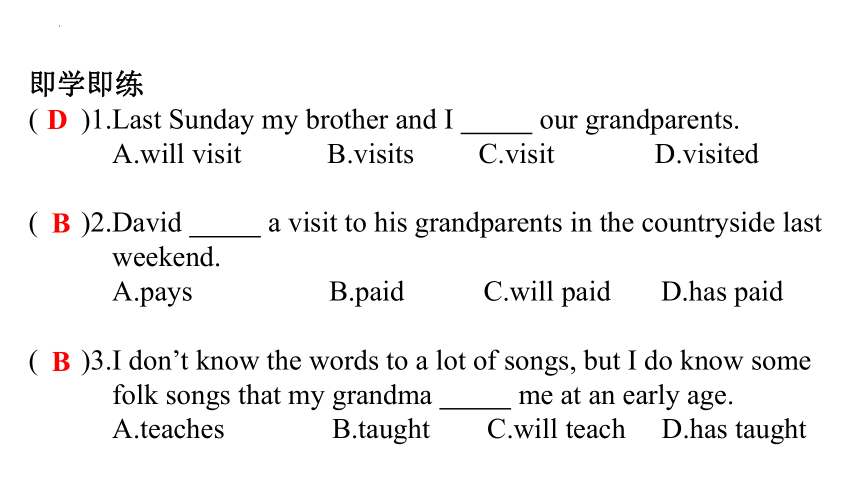
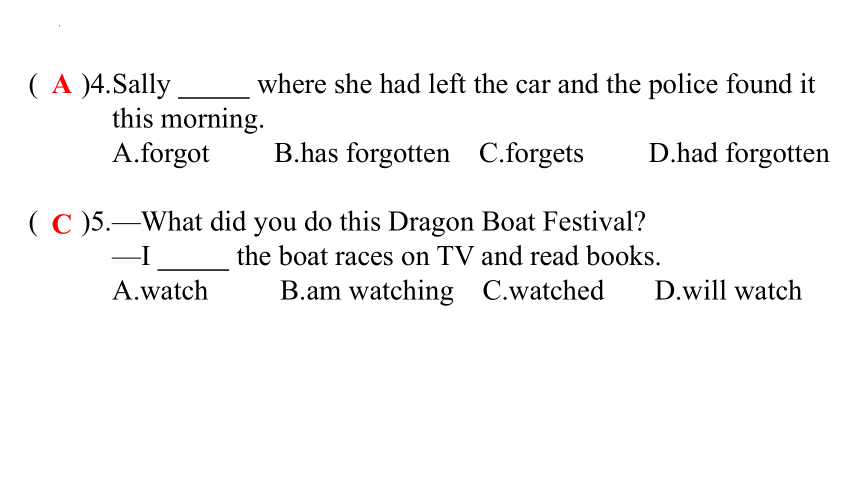
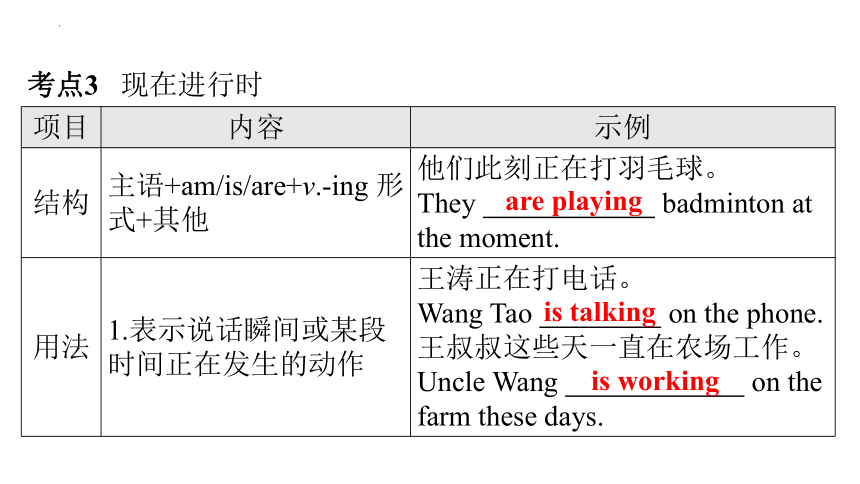
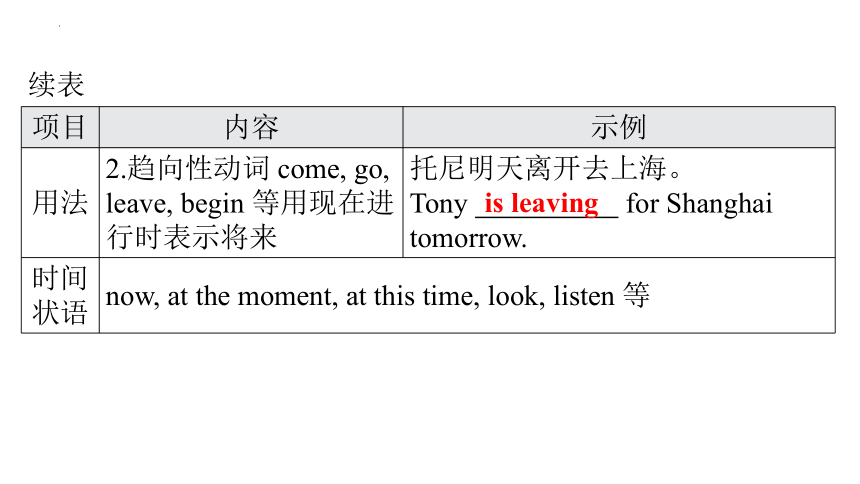
文档简介
(共53张PPT)
动词的时态
思维导图
考点精讲
考点1 一般现在时
项目 内容 示例
结构 1.主语+am/is/are+其他 他是医生。He ____ a doctor.
2.主语+动词原形/第三人称单数形式+其他 他经常说谎。He often ____.
用法 1.表示现阶段经常性或习惯性发生的动作或存在的状态 他生病了。He _____.
我经常熬夜。I often _______.
is
lies
is ill
stay up
续表
项目 内容 示例
用法 2.表示主语所具有的特征、品质或能力等 那个男人很高。
The man ______.
她打中国功夫。
She ______ Chinese kungfu.
3.表示客观真理、自然现象、格言等 中国在亚洲东部。
China ______ in the east of Asia.
时间 状语 sometimes, often, always, usually, seldom, hardly, never, every day /week/month/year..., once/twice...a week, on Sunday/Monday...
is tall
plays
lies
即学即练
( )1.Every year thousands of tourists the mountain area to
relax themselves.
A.visited B.were visiting C.visit D.have visited
( )2.—Lily, what do you usually do after school
—I exercise with my friends.
A.do B.did C.will do D.was doing
C
A
( )3.—We very simply and do not spend much money on
food.
—That’s why you’re called the Greens.
A.eat B.ate C.will eat D.had eat
( )4.In the past people didn’t know that the earth around the
sun.
A.will move B.moved C.would move D.moves
( )5.Mid-Autumn Day usually on August 15th in the lunar
calendar every year.
A.come B.comes C.is coming D.will come
A
D
B
考点2 一般过去时
项目 内容 示例
结构 1.主语+was/were+其他 丽萨昨天生病了。
Lisa yesterday.
2.主语+动词的过去式+其他 他们上周去了海滩。
They to the beach last week.
用法 1.表示过去某时间发生的动作或存在的状态 约翰2012年出生。
John in 2012.
was ill
went
was born
续表
项目 内容 示例
用法 2.表示过去经常性或习惯性发生的动作 我今天早上6点起床。
I up at six this morning.
3.表示主语过去所具有的特征、品质或能力等 她5岁的时候就会跳舞。
She dance at the age of five.
时间 状语 yesterday, yesterday morning/afternoon/evening, last night/ week/month, ...years ago, in 1995, in the past, the other day, just now
got
could
即学即练
( )1.Last Sunday my brother and I our grandparents.
A.will visit B.visits C.visit D.visited
( )2.David a visit to his grandparents in the countryside last
weekend.
A.pays B.paid C.will paid D.has paid
( )3.I don’t know the words to a lot of songs, but I do know some
folk songs that my grandma me at an early age.
A.teaches B.taught C.will teach D.has taught
D
B
B
( )4.Sally where she had left the car and the police found it
this morning.
A.forgot B.has forgotten C.forgets D.had forgotten
( )5.—What did you do this Dragon Boat Festival
—I the boat races on TV and read books.
A.watch B.am watching C.watched D.will watch
A
C
考点3 现在进行时
项目 内容 示例
结构 主语+am/is/are+v.-ing 形式+其他 他们此刻正在打羽毛球。
They badminton at the moment.
用法 1.表示说话瞬间或某段时间正在发生的动作 王涛正在打电话。
Wang Tao on the phone.
王叔叔这些天一直在农场工作。
Uncle Wang on the farm these days.
are playing
is talking
is working
续表
项目 内容 示例
用法 2.趋向性动词 come, go, leave, begin 等用现在进行时表示将来 托尼明天离开去上海。
Tony for Shanghai tomorrow.
时间状语 now, at the moment, at this time, look, listen 等
is leaving
即学即练
( )1.—The coffee’s finished!
—Oh, sorry! I to the shop to get some.
A.am going B.was going C.went D.have gone
( )2.—Lily, can you get my dictionary
—Wait a minute, Lucy. I clothes.
A.washed B.am washing C.will wash D.have washed
( )3.—The classroom is so quiet.
—Yes, all the students for the final exam.
A.prepare B.prepared C.will prepare D.are preparing
A
B
D
( )4.Hurry up! Mr. Brown for us in the meeting room at the
moment.
A.is waiting B.was waiting C.waited D.waits
( )5.—Where is mom
—In the living room. She a book at the moment.
A.was reading B.will read C.is reading D.has read
A
C
考点4 过去进行时
项目 内容 示例
结构 主语+was/were +v.-ing形式+其他 那个时候你在做什么?
What you at that time
用法 1.表示过去某个时间点或某段时间正在发生的动作 昨天这个时候我在睡觉。
I at this time yesterday.
2.表示一个动作发生的一刻,另一个动作正在进行 当我到达的时候,她正在听音乐。
She to music when I arrived.
were doing
was sleeping
was listening
续表
项目 内容 示例
用法 3.表示一个动作正在进行时,另一个动作发生了 当我们正在举行聚会时,灯突然灭了。
While we a party, the light went out.
4.表示一个动作正在进行时,另一个动作也在进行 玛丽在做作业时,她的妈妈在做饭。
Mary her homework while her mom .
时间 状语 this time yesterday, at that time, then, at 9:00 last Sunday morning, all night, when+过去时, while+进行时
were having
was doing
was cooking
即学即练
( )1.Mike the furniture into his new flat this time yesterday.
A.will move B.was moving C.has moved D.had moved
( )2.—Why didn’t Alice come to the party last night
—Because she online classes at that time.
A.takes B.took C.was taking D.has take
( )3.I saw Bob in the garden. He flowers there.
A.waters B.has watered C.is watering D.was watering
B
C
D
( )4.While Linda was still sleeping, her mother breakfast in
the kitchen.
A.was making B.is making C.has made D.will make
( )5.—What happened to Mrs. Smart
—She cut herself while she lunch.
A.prepares B.is preparing
C.was preparing D.prepared
A
C
考点5 一般将来时
项目 内容 示例
结构 1.主语+will+动词原形+其他 中国未来将会建立自己的空间站。
China its own space station in the future.
2.主语+be going to+动词原形+其他 汤姆计划学习医学。
Tom medicine.
will build
is going to study
续表
项目 内容 示例
用法 1.表示将要发生的动作或存在的状态 下学期王老师将会教我们英语吗?
Ms. Wang us English next term
她三天后将会回来。
She in three days.
2.表示计划、打算做某事,常指已决定的、很可能发生的或有迹象即将发生的事 看那些乌云。快要下雨了。
Look at the black clouds. It’s .
Will teach
will be back
going to rain
续表
项目 内容 示例
时间 状语 tomorrow, tomorrow morning…, next week/month…, in a few days, in 2050, in the future 等
特别 注意 主将从现原则:在时间或条件从句中,如果主句是一般将来时,从句用一般现在时 如果明天不下雨,我们会去公园。
We to the park if it ____________ tomorrow.
will go doesn’t rain
即学即练
( )1.—Have scientists found life on Mars
—Not yet, but I think they it some day.
A.find B.found C.have found D.will find
( )2.—What’s your plan for the summer holiday?
—I’ll go to Chengdu as soon as the school term .
A.end B.ends C.will end D.has ended
( )3.You can borrow this film, surely you watching it.
A.enjoy B.enjoyed C.will enjoy D.have enjoyed
D
B
C
( )4.—Is Helen here
—No, she isn’t here. She in half an hour.
A.arrives B.arrived C.will arrive D.has arrived
( )5.There a basketball match this evening.
A.is going to be B.was
C.will have D.has been
C
A
考点6 现在完成时
项目 内容 示例
结构 主语+have/has+过去分词+其他 我已经吃过早饭了。
I breakfast already.
用法 1.表示过去发生的动作对现在造成的影响或结果,常与already, yet, so far, in the past/last…years等连用 她刚刚做完家务。
She just doing the housework.
他们还没有找到那个失踪的孩子。
They the lost kid yet.
have had
has finished
haven’t found
续表
项目 内容 示例
用法 2.表示经历,常与ever, never, just, before 等连用 你曾经参观过长城吗?
you ever the Great Wall
她从来没吃过这么好吃的食物。
She never such delicious food.
Have visited
has eaten
续表
项目 内容 示例
用法 3.表示过去发生的动作一直持续到现在,常与 for 或 since 引导的时间状语连用 琳达已经睡了一整天了。
Linda for a whole day.
玲玲自6岁起就练习跳舞。
Lingling dancing since she was six.
时间状语 already, yet, ever, never, just, before, so far, in the past/last… years, for+一段时间,since+过去的时间点或从句
has slept
has practiced
续表
项目 内容 示例
特别 注意 have been to 去过 (人已回来) have gone to 去了 (人未回来) 玛丽去中国了。
Mary has to China.
玛丽去过中国2次。
Mary has to China twice.
表示过去发生的动作一直持续到现在,谓语动词须用延续性动词,不能用非延续性动词 他的父亲已经去世十年了。
His father dead for ten years.
电影已经上映5分钟了。
The film has for 5 minutes.
gone
been
has been
been on
续表
项目 内容 示例
非延续性动词与延续性动词转化表 buy-have borrow-keep become-be catch a cold-have a cold begin/start-be on come/go-be in/at leave-be away come back/go back-be back fall asleep-be asleep come out/go out-be out die-be dead put on-be in/wear finish/end-be over close/open-be closed/be open join-be in/be a member of marry/get married-be married
即学即练
( )1.—COVID-19 is spreading wildly in India. Take care!
—Yes. More than 300,000 people there.
A.have died B.has died C.die D.will die
( )2.I joined the book club last month and I five books
already.
A.am reading B.have read C.will read D.read
( )3.The documentary A Plastic Ocean is so impressive that I ____
it several times so far.
A.watched B.watch C.have watched D.will watch
A
B
C
( )4.China great achievements in science and technology
since 1978.
A.makes B.made C.has made D.is made
( )5.—The air here is much fresher than before.
—Exactly! We a lot of trees in the past few years.
A.planted B.were planting
C.will plant D.have planted
C
D
2022 中考真题
( )1.He _____ newspapers at 8:00 every evening. (2022·湖北)
A.reads B.is reading C.was reading D.has read
( )2.—What’s your plan for the weekend, Helen
—I _____ my grandparents. (2022·辽宁大连)
A.visit B.visited
C.have visited D.am going to visit
A
D
( )3.— As far as I know, there _____ a high-speed train from Yulin
to Shenzhen in 2023.
—Yeah! It will be more convenient for the people in Yulin.
(2022·广西玉林)
A.will be B.has C.is D.will have
( )4.It only takes us two hours to go from Jishou to Changsha by
train when Zhang-Ji-Huai high-speed railway _________ in December last year. (2022·湖南湘西)
A.opens B.opened C.will open D.has opened
A
B
( )5.—Daniel has gone to Beijing on business.
—Oh, I didn’t know. When _____ (2022·江苏徐州)
A.has he left B.was he leaving
C.did he leave D.will he leave
( )6.—What are you doing
—I _____ the book The Old Man and Sea. (2022·湖南湘西)
A.am reading B.was reading
C.read D.has read
C
A
( )7.—Wow! The music sounds wonderful!
—Yes. Jessie ___ the violin in the next room. (2022·广西梧州)
A.plays B.played C.is playing D.was playing
( )8.— What were you doing when I called you last night
—I _____ football with my father. (2022·广西)
A.play B.was playing C.will play D.played
( )9.Sally _____ with a Chinese family since she came to Dalian.
(2022·辽宁大连)
A.stays B.will stay C.has stayed D.was staying
C
B
C
( )10.—Where’s Mr. Yang
—He _____ Longquan Mountain in Danzhai. He_____ there three times because he enjoys the local scenery.
(2022·贵州黔东南)
A.has gone to; has been B.has gone to; has gone to
C.has been to; has gone D.has been to; has been to
A
语篇训练
(一)
Last week, my friends and I had a discussion. We 1 about the rules that we have in school.
At our school, we have to wear uniforms every day. The problem is that all my classmates think the uniforms 2 ugly. We think young people should look smart and so we would like to wear our own clothes.
( )1.A.talk B.talked C.are talking D.were talking
( )2.A.was B.is C.were D.are
B
D
【解析】1.B 考查动词时态。句意:我们谈论了我们学校的规则。根据语境以及上下文可知,此处时态是一般过去时,故选 B。
【解析】2.D 考查动词时态。句意:问题是我所有的同学都认为校服很难看。根据语境以及上下文可知,此处时态是一般现在时,故选 D。
Our teachers believe that if we do that, we 3 more on our clothes than our studies. We 4 . We will feel more comfortable and that is good for our studies. If we can’t do that, we should be allowed to design our uniforms. That would be a good way to keep both teachers and students happy.
( )3.A.focus B.focused
C.will focus D.have focused
( )4.A.disagree B.disagreed
C.will disagree D.has disagreed
C
A
【解析】3.C 考查动词时态。句意:我们的老师认为,如果我们这样做,我们将更多地关注我们的衣服而不是学习。根据语境以及上下文可知,此处时态是一般将来时,故选 C。
【解析】4.A 考查动词时态。句意:我们不赞同。根据语境以及上下文可知,此处时态是一般现在时,故选 A。
(二)
Lewis Carroll is the author of the children’s classic Alice’s Adventures in Wonderland. He 1 one of the most famous writers who writes children’s books. His real name was Charles Lutwidge Dodgson.
( )1.A.will be B.is C.has been D.would be
B
【解析】1.B 考查动词时态。句意:他是最著名的写儿童书的作家之一。根据语境以及上文可知,此处时态是一般现在时,故选 B。
After finishing his studies, Carroll 2 as a teacher at Oxford. He also wrote essays and poems. Carroll loved children. He became friends with the Liddel sisters Alice, Lorina and Edith. One day, Carroll told the girls a story of Alice’s Adventures. Alice liked it very much and Carroll wrote it down at Alice’s request.
The story came out in 1865. It 3 one of the most popular children’s books in the world now.
( )2.A.worked B.was working C.would work D.is working
( )3.A.becomes B.became C.has become D.will become
A
C
【解析】2.A 考查动词时态。句意:完成学业后,卡罗尔成为了牛津大学的一名教师。根据语境以及下文可知,此处时态是一般过去时,故选 A。
【解析】3.C 考查动词时态。句意:它已经成为现在世界上最受欢迎的儿童书籍之一。根据语境可知,此处时态是现在完成时,故选 C。
(三)
Once there was a beautiful young girl named Alida. She 1 . the daughter of a chief (首领). The chief was at war with a nearby tribe (部落). Alida loved to pick flowers in the jungle (丛林). One day she met a young man named Taroo in the jungle and 2 in love with him. Taroo talked about his father’s name at a time. “Our fathers
3 enemies,” she said surprisedly. But Taroo said, “Their problems are not ours.” Unfortunately, someone from Alida’s tribe saw the two lovers and told Alida’s father about it.
1. ______
2.______
was
fell
【解析】考查动词时态。句意:她是一个首领的女儿。根据语境可知,此处意为 “是” ,且根据上下文可知,时态是一般过去时,故填was。
【解析】考查动词时态。句意:有一天,她在丛林中遇到一个叫 Taroo 的年轻人,并爱上了他。根据语境以及 and 连接两个并列成分可知,此处时态是一般过去式,故填 fell。
3. ________
are
【解析】考查动词时态。句意:我们的父亲是敌人。 根据语境以及下文可知,此处时态是一般现在时,故填 are。
(四)
Mona was a young girl who lived in India. One night she 1 . the moon climbing into the sky slowly. 2 beautiful it was! Suddenly, a shining line of light from the moon danced right into her room and said, “The old woman on the moon invites you for a visit. Will you come with me I will bring you back 3 a few days.”
( )1.A.see B.saw C.will see
( )2.A.How B.What C.What a
( )3.A.in B.on C.after
B
A
A
【解析】1.B 考查动词时态。句意:一天晚上,她看到月亮慢慢地爬上了天空。根据语境以及上下文可知,此处时态是一般过去时,故选 B。
【解析】2.A 考查感叹句。句意:它真漂亮啊!分析句子结构可知,此处是一个感叹句,句型为:How+形容词+主语+谓语!故选 A。
【解析】3.A 考查介词。句意:几天后我就会带你回来。 in+时间段是固定搭配,意为 “一段时间之后” , 故选 A。
Mona was very 4 and set off with the moonlight. Stars and planets hurried past them. At last they reached the top of a mountain. The moonlight finally stopped at the entrance of a beautiful castle which 5 of moonstones.
( )4.A.excite B.exciting C.excited
( )5.A.made B.is made C.was made
C
C
【解析】4.C 考查形容词。句意:莫娜非常兴奋,伴着月光出发了。根据语境可知,此处表示人的主观感 受,用以-ed结尾的形容词,故选 C。
【解析】5.C 考查被动语态。句意:月光终于在一座美丽的由月光石制成的城堡入口停了下来。主语 castle 与谓语动词 make 之间存在被动关系,且根据上下文可知,时态是一般过去时,故选 C。
A very old woman, whose white flowing hair almost touched the ground gently greeted the girl. She said, “You are the first human
6 I have ever met. I 7 here for millions of years, I am so lonely. Please tell me about your life.”
Mona was a kind girl and she had compassion (同情) for the old woman. In the following days she stayed with the old woman and told her about 8 life on the moon.
( )6.A.whom B.which C.when
( )7.A.was B.will be C.have been
( )8.A.a B.the C.an
A
C
B
【解析】6.A 考查定语从句的关系代词。句意:你是我见到的第一个人类。分析句子结构可知,此处是一个定语从句,先行词 the first human 指人,关系代 词在从句中做 met 的宾语,故选 A。
【解析】7.C 考查动词时态。句意:我已经在这里呆了几百万年了,我是如此的孤独。根据语境可知,此处时态为现在完成时,故选 C。
【解析】8.B 考查冠词。句意:在接下来的日子里,她和老妇人呆在一起,并告诉她关于月球上的生活。 根据语境可知,此处特指 “月球上的生活” ,用定冠词the,故选B 。
Suddenly, Mona felt someone was pushing her. Then she opened her eyes and saw her mom. Her mother said to her, “Mona, wake up! You have slept the whole day. Come and have some food.”
Later on, Mona took part in a writing competition in her school. Mona wrote about her wonderful dream 9 won the first prize. Mona’s parents were very happy with what their daughter achieved and encouraged her 10 on writing. Soon Mona became a writer and wrote many good stories for children.(2022 湖南中考真题改编)
( )9.A.and B.or C.but
( )10.A.keep B.keeping C.to keep
A
C
【解析】9.A 考查连词。句意:莫娜写了她美妙的梦,并赢得了一等奖。根据语境可知,此处连接两个并列成分,用 and,故选 A。
【解析】10.C 考查非谓语动词。句意:莫娜的父母对女儿取得的成绩非常满意,并鼓励她继续写作。 encourage sb. to do sth. 是固定搭配,意为 “鼓励某人做某事” ,动词用不定式,故选 C。
动词的时态
思维导图
考点精讲
考点1 一般现在时
项目 内容 示例
结构 1.主语+am/is/are+其他 他是医生。He ____ a doctor.
2.主语+动词原形/第三人称单数形式+其他 他经常说谎。He often ____.
用法 1.表示现阶段经常性或习惯性发生的动作或存在的状态 他生病了。He _____.
我经常熬夜。I often _______.
is
lies
is ill
stay up
续表
项目 内容 示例
用法 2.表示主语所具有的特征、品质或能力等 那个男人很高。
The man ______.
她打中国功夫。
She ______ Chinese kungfu.
3.表示客观真理、自然现象、格言等 中国在亚洲东部。
China ______ in the east of Asia.
时间 状语 sometimes, often, always, usually, seldom, hardly, never, every day /week/month/year..., once/twice...a week, on Sunday/Monday...
is tall
plays
lies
即学即练
( )1.Every year thousands of tourists the mountain area to
relax themselves.
A.visited B.were visiting C.visit D.have visited
( )2.—Lily, what do you usually do after school
—I exercise with my friends.
A.do B.did C.will do D.was doing
C
A
( )3.—We very simply and do not spend much money on
food.
—That’s why you’re called the Greens.
A.eat B.ate C.will eat D.had eat
( )4.In the past people didn’t know that the earth around the
sun.
A.will move B.moved C.would move D.moves
( )5.Mid-Autumn Day usually on August 15th in the lunar
calendar every year.
A.come B.comes C.is coming D.will come
A
D
B
考点2 一般过去时
项目 内容 示例
结构 1.主语+was/were+其他 丽萨昨天生病了。
Lisa yesterday.
2.主语+动词的过去式+其他 他们上周去了海滩。
They to the beach last week.
用法 1.表示过去某时间发生的动作或存在的状态 约翰2012年出生。
John in 2012.
was ill
went
was born
续表
项目 内容 示例
用法 2.表示过去经常性或习惯性发生的动作 我今天早上6点起床。
I up at six this morning.
3.表示主语过去所具有的特征、品质或能力等 她5岁的时候就会跳舞。
She dance at the age of five.
时间 状语 yesterday, yesterday morning/afternoon/evening, last night/ week/month, ...years ago, in 1995, in the past, the other day, just now
got
could
即学即练
( )1.Last Sunday my brother and I our grandparents.
A.will visit B.visits C.visit D.visited
( )2.David a visit to his grandparents in the countryside last
weekend.
A.pays B.paid C.will paid D.has paid
( )3.I don’t know the words to a lot of songs, but I do know some
folk songs that my grandma me at an early age.
A.teaches B.taught C.will teach D.has taught
D
B
B
( )4.Sally where she had left the car and the police found it
this morning.
A.forgot B.has forgotten C.forgets D.had forgotten
( )5.—What did you do this Dragon Boat Festival
—I the boat races on TV and read books.
A.watch B.am watching C.watched D.will watch
A
C
考点3 现在进行时
项目 内容 示例
结构 主语+am/is/are+v.-ing 形式+其他 他们此刻正在打羽毛球。
They badminton at the moment.
用法 1.表示说话瞬间或某段时间正在发生的动作 王涛正在打电话。
Wang Tao on the phone.
王叔叔这些天一直在农场工作。
Uncle Wang on the farm these days.
are playing
is talking
is working
续表
项目 内容 示例
用法 2.趋向性动词 come, go, leave, begin 等用现在进行时表示将来 托尼明天离开去上海。
Tony for Shanghai tomorrow.
时间状语 now, at the moment, at this time, look, listen 等
is leaving
即学即练
( )1.—The coffee’s finished!
—Oh, sorry! I to the shop to get some.
A.am going B.was going C.went D.have gone
( )2.—Lily, can you get my dictionary
—Wait a minute, Lucy. I clothes.
A.washed B.am washing C.will wash D.have washed
( )3.—The classroom is so quiet.
—Yes, all the students for the final exam.
A.prepare B.prepared C.will prepare D.are preparing
A
B
D
( )4.Hurry up! Mr. Brown for us in the meeting room at the
moment.
A.is waiting B.was waiting C.waited D.waits
( )5.—Where is mom
—In the living room. She a book at the moment.
A.was reading B.will read C.is reading D.has read
A
C
考点4 过去进行时
项目 内容 示例
结构 主语+was/were +v.-ing形式+其他 那个时候你在做什么?
What you at that time
用法 1.表示过去某个时间点或某段时间正在发生的动作 昨天这个时候我在睡觉。
I at this time yesterday.
2.表示一个动作发生的一刻,另一个动作正在进行 当我到达的时候,她正在听音乐。
She to music when I arrived.
were doing
was sleeping
was listening
续表
项目 内容 示例
用法 3.表示一个动作正在进行时,另一个动作发生了 当我们正在举行聚会时,灯突然灭了。
While we a party, the light went out.
4.表示一个动作正在进行时,另一个动作也在进行 玛丽在做作业时,她的妈妈在做饭。
Mary her homework while her mom .
时间 状语 this time yesterday, at that time, then, at 9:00 last Sunday morning, all night, when+过去时, while+进行时
were having
was doing
was cooking
即学即练
( )1.Mike the furniture into his new flat this time yesterday.
A.will move B.was moving C.has moved D.had moved
( )2.—Why didn’t Alice come to the party last night
—Because she online classes at that time.
A.takes B.took C.was taking D.has take
( )3.I saw Bob in the garden. He flowers there.
A.waters B.has watered C.is watering D.was watering
B
C
D
( )4.While Linda was still sleeping, her mother breakfast in
the kitchen.
A.was making B.is making C.has made D.will make
( )5.—What happened to Mrs. Smart
—She cut herself while she lunch.
A.prepares B.is preparing
C.was preparing D.prepared
A
C
考点5 一般将来时
项目 内容 示例
结构 1.主语+will+动词原形+其他 中国未来将会建立自己的空间站。
China its own space station in the future.
2.主语+be going to+动词原形+其他 汤姆计划学习医学。
Tom medicine.
will build
is going to study
续表
项目 内容 示例
用法 1.表示将要发生的动作或存在的状态 下学期王老师将会教我们英语吗?
Ms. Wang us English next term
她三天后将会回来。
She in three days.
2.表示计划、打算做某事,常指已决定的、很可能发生的或有迹象即将发生的事 看那些乌云。快要下雨了。
Look at the black clouds. It’s .
Will teach
will be back
going to rain
续表
项目 内容 示例
时间 状语 tomorrow, tomorrow morning…, next week/month…, in a few days, in 2050, in the future 等
特别 注意 主将从现原则:在时间或条件从句中,如果主句是一般将来时,从句用一般现在时 如果明天不下雨,我们会去公园。
We to the park if it ____________ tomorrow.
will go doesn’t rain
即学即练
( )1.—Have scientists found life on Mars
—Not yet, but I think they it some day.
A.find B.found C.have found D.will find
( )2.—What’s your plan for the summer holiday?
—I’ll go to Chengdu as soon as the school term .
A.end B.ends C.will end D.has ended
( )3.You can borrow this film, surely you watching it.
A.enjoy B.enjoyed C.will enjoy D.have enjoyed
D
B
C
( )4.—Is Helen here
—No, she isn’t here. She in half an hour.
A.arrives B.arrived C.will arrive D.has arrived
( )5.There a basketball match this evening.
A.is going to be B.was
C.will have D.has been
C
A
考点6 现在完成时
项目 内容 示例
结构 主语+have/has+过去分词+其他 我已经吃过早饭了。
I breakfast already.
用法 1.表示过去发生的动作对现在造成的影响或结果,常与already, yet, so far, in the past/last…years等连用 她刚刚做完家务。
She just doing the housework.
他们还没有找到那个失踪的孩子。
They the lost kid yet.
have had
has finished
haven’t found
续表
项目 内容 示例
用法 2.表示经历,常与ever, never, just, before 等连用 你曾经参观过长城吗?
you ever the Great Wall
她从来没吃过这么好吃的食物。
She never such delicious food.
Have visited
has eaten
续表
项目 内容 示例
用法 3.表示过去发生的动作一直持续到现在,常与 for 或 since 引导的时间状语连用 琳达已经睡了一整天了。
Linda for a whole day.
玲玲自6岁起就练习跳舞。
Lingling dancing since she was six.
时间状语 already, yet, ever, never, just, before, so far, in the past/last… years, for+一段时间,since+过去的时间点或从句
has slept
has practiced
续表
项目 内容 示例
特别 注意 have been to 去过 (人已回来) have gone to 去了 (人未回来) 玛丽去中国了。
Mary has to China.
玛丽去过中国2次。
Mary has to China twice.
表示过去发生的动作一直持续到现在,谓语动词须用延续性动词,不能用非延续性动词 他的父亲已经去世十年了。
His father dead for ten years.
电影已经上映5分钟了。
The film has for 5 minutes.
gone
been
has been
been on
续表
项目 内容 示例
非延续性动词与延续性动词转化表 buy-have borrow-keep become-be catch a cold-have a cold begin/start-be on come/go-be in/at leave-be away come back/go back-be back fall asleep-be asleep come out/go out-be out die-be dead put on-be in/wear finish/end-be over close/open-be closed/be open join-be in/be a member of marry/get married-be married
即学即练
( )1.—COVID-19 is spreading wildly in India. Take care!
—Yes. More than 300,000 people there.
A.have died B.has died C.die D.will die
( )2.I joined the book club last month and I five books
already.
A.am reading B.have read C.will read D.read
( )3.The documentary A Plastic Ocean is so impressive that I ____
it several times so far.
A.watched B.watch C.have watched D.will watch
A
B
C
( )4.China great achievements in science and technology
since 1978.
A.makes B.made C.has made D.is made
( )5.—The air here is much fresher than before.
—Exactly! We a lot of trees in the past few years.
A.planted B.were planting
C.will plant D.have planted
C
D
2022 中考真题
( )1.He _____ newspapers at 8:00 every evening. (2022·湖北)
A.reads B.is reading C.was reading D.has read
( )2.—What’s your plan for the weekend, Helen
—I _____ my grandparents. (2022·辽宁大连)
A.visit B.visited
C.have visited D.am going to visit
A
D
( )3.— As far as I know, there _____ a high-speed train from Yulin
to Shenzhen in 2023.
—Yeah! It will be more convenient for the people in Yulin.
(2022·广西玉林)
A.will be B.has C.is D.will have
( )4.It only takes us two hours to go from Jishou to Changsha by
train when Zhang-Ji-Huai high-speed railway _________ in December last year. (2022·湖南湘西)
A.opens B.opened C.will open D.has opened
A
B
( )5.—Daniel has gone to Beijing on business.
—Oh, I didn’t know. When _____ (2022·江苏徐州)
A.has he left B.was he leaving
C.did he leave D.will he leave
( )6.—What are you doing
—I _____ the book The Old Man and Sea. (2022·湖南湘西)
A.am reading B.was reading
C.read D.has read
C
A
( )7.—Wow! The music sounds wonderful!
—Yes. Jessie ___ the violin in the next room. (2022·广西梧州)
A.plays B.played C.is playing D.was playing
( )8.— What were you doing when I called you last night
—I _____ football with my father. (2022·广西)
A.play B.was playing C.will play D.played
( )9.Sally _____ with a Chinese family since she came to Dalian.
(2022·辽宁大连)
A.stays B.will stay C.has stayed D.was staying
C
B
C
( )10.—Where’s Mr. Yang
—He _____ Longquan Mountain in Danzhai. He_____ there three times because he enjoys the local scenery.
(2022·贵州黔东南)
A.has gone to; has been B.has gone to; has gone to
C.has been to; has gone D.has been to; has been to
A
语篇训练
(一)
Last week, my friends and I had a discussion. We 1 about the rules that we have in school.
At our school, we have to wear uniforms every day. The problem is that all my classmates think the uniforms 2 ugly. We think young people should look smart and so we would like to wear our own clothes.
( )1.A.talk B.talked C.are talking D.were talking
( )2.A.was B.is C.were D.are
B
D
【解析】1.B 考查动词时态。句意:我们谈论了我们学校的规则。根据语境以及上下文可知,此处时态是一般过去时,故选 B。
【解析】2.D 考查动词时态。句意:问题是我所有的同学都认为校服很难看。根据语境以及上下文可知,此处时态是一般现在时,故选 D。
Our teachers believe that if we do that, we 3 more on our clothes than our studies. We 4 . We will feel more comfortable and that is good for our studies. If we can’t do that, we should be allowed to design our uniforms. That would be a good way to keep both teachers and students happy.
( )3.A.focus B.focused
C.will focus D.have focused
( )4.A.disagree B.disagreed
C.will disagree D.has disagreed
C
A
【解析】3.C 考查动词时态。句意:我们的老师认为,如果我们这样做,我们将更多地关注我们的衣服而不是学习。根据语境以及上下文可知,此处时态是一般将来时,故选 C。
【解析】4.A 考查动词时态。句意:我们不赞同。根据语境以及上下文可知,此处时态是一般现在时,故选 A。
(二)
Lewis Carroll is the author of the children’s classic Alice’s Adventures in Wonderland. He 1 one of the most famous writers who writes children’s books. His real name was Charles Lutwidge Dodgson.
( )1.A.will be B.is C.has been D.would be
B
【解析】1.B 考查动词时态。句意:他是最著名的写儿童书的作家之一。根据语境以及上文可知,此处时态是一般现在时,故选 B。
After finishing his studies, Carroll 2 as a teacher at Oxford. He also wrote essays and poems. Carroll loved children. He became friends with the Liddel sisters Alice, Lorina and Edith. One day, Carroll told the girls a story of Alice’s Adventures. Alice liked it very much and Carroll wrote it down at Alice’s request.
The story came out in 1865. It 3 one of the most popular children’s books in the world now.
( )2.A.worked B.was working C.would work D.is working
( )3.A.becomes B.became C.has become D.will become
A
C
【解析】2.A 考查动词时态。句意:完成学业后,卡罗尔成为了牛津大学的一名教师。根据语境以及下文可知,此处时态是一般过去时,故选 A。
【解析】3.C 考查动词时态。句意:它已经成为现在世界上最受欢迎的儿童书籍之一。根据语境可知,此处时态是现在完成时,故选 C。
(三)
Once there was a beautiful young girl named Alida. She 1 . the daughter of a chief (首领). The chief was at war with a nearby tribe (部落). Alida loved to pick flowers in the jungle (丛林). One day she met a young man named Taroo in the jungle and 2 in love with him. Taroo talked about his father’s name at a time. “Our fathers
3 enemies,” she said surprisedly. But Taroo said, “Their problems are not ours.” Unfortunately, someone from Alida’s tribe saw the two lovers and told Alida’s father about it.
1. ______
2.______
was
fell
【解析】考查动词时态。句意:她是一个首领的女儿。根据语境可知,此处意为 “是” ,且根据上下文可知,时态是一般过去时,故填was。
【解析】考查动词时态。句意:有一天,她在丛林中遇到一个叫 Taroo 的年轻人,并爱上了他。根据语境以及 and 连接两个并列成分可知,此处时态是一般过去式,故填 fell。
3. ________
are
【解析】考查动词时态。句意:我们的父亲是敌人。 根据语境以及下文可知,此处时态是一般现在时,故填 are。
(四)
Mona was a young girl who lived in India. One night she 1 . the moon climbing into the sky slowly. 2 beautiful it was! Suddenly, a shining line of light from the moon danced right into her room and said, “The old woman on the moon invites you for a visit. Will you come with me I will bring you back 3 a few days.”
( )1.A.see B.saw C.will see
( )2.A.How B.What C.What a
( )3.A.in B.on C.after
B
A
A
【解析】1.B 考查动词时态。句意:一天晚上,她看到月亮慢慢地爬上了天空。根据语境以及上下文可知,此处时态是一般过去时,故选 B。
【解析】2.A 考查感叹句。句意:它真漂亮啊!分析句子结构可知,此处是一个感叹句,句型为:How+形容词+主语+谓语!故选 A。
【解析】3.A 考查介词。句意:几天后我就会带你回来。 in+时间段是固定搭配,意为 “一段时间之后” , 故选 A。
Mona was very 4 and set off with the moonlight. Stars and planets hurried past them. At last they reached the top of a mountain. The moonlight finally stopped at the entrance of a beautiful castle which 5 of moonstones.
( )4.A.excite B.exciting C.excited
( )5.A.made B.is made C.was made
C
C
【解析】4.C 考查形容词。句意:莫娜非常兴奋,伴着月光出发了。根据语境可知,此处表示人的主观感 受,用以-ed结尾的形容词,故选 C。
【解析】5.C 考查被动语态。句意:月光终于在一座美丽的由月光石制成的城堡入口停了下来。主语 castle 与谓语动词 make 之间存在被动关系,且根据上下文可知,时态是一般过去时,故选 C。
A very old woman, whose white flowing hair almost touched the ground gently greeted the girl. She said, “You are the first human
6 I have ever met. I 7 here for millions of years, I am so lonely. Please tell me about your life.”
Mona was a kind girl and she had compassion (同情) for the old woman. In the following days she stayed with the old woman and told her about 8 life on the moon.
( )6.A.whom B.which C.when
( )7.A.was B.will be C.have been
( )8.A.a B.the C.an
A
C
B
【解析】6.A 考查定语从句的关系代词。句意:你是我见到的第一个人类。分析句子结构可知,此处是一个定语从句,先行词 the first human 指人,关系代 词在从句中做 met 的宾语,故选 A。
【解析】7.C 考查动词时态。句意:我已经在这里呆了几百万年了,我是如此的孤独。根据语境可知,此处时态为现在完成时,故选 C。
【解析】8.B 考查冠词。句意:在接下来的日子里,她和老妇人呆在一起,并告诉她关于月球上的生活。 根据语境可知,此处特指 “月球上的生活” ,用定冠词the,故选B 。
Suddenly, Mona felt someone was pushing her. Then she opened her eyes and saw her mom. Her mother said to her, “Mona, wake up! You have slept the whole day. Come and have some food.”
Later on, Mona took part in a writing competition in her school. Mona wrote about her wonderful dream 9 won the first prize. Mona’s parents were very happy with what their daughter achieved and encouraged her 10 on writing. Soon Mona became a writer and wrote many good stories for children.(2022 湖南中考真题改编)
( )9.A.and B.or C.but
( )10.A.keep B.keeping C.to keep
A
C
【解析】9.A 考查连词。句意:莫娜写了她美妙的梦,并赢得了一等奖。根据语境可知,此处连接两个并列成分,用 and,故选 A。
【解析】10.C 考查非谓语动词。句意:莫娜的父母对女儿取得的成绩非常满意,并鼓励她继续写作。 encourage sb. to do sth. 是固定搭配,意为 “鼓励某人做某事” ,动词用不定式,故选 C。
同课章节目录
- 词法
- 名词
- 动词和动词短语
- 动词语态
- 动词时态
- 助动词和情态动词
- 非谓语动词
- 冠词
- 代词
- 数词和量词
- 形容词副词及其比较等级
- 介词和介词短语
- 连词和感叹词
- 构词法
- 相似、相近词比较
- 句法
- 陈述句
- 一般疑问句和否定疑问句
- 特殊疑问句及选择疑问句
- 反意疑问句
- 存在句(There be句型)
- 宾语从句
- 定语从句
- 状语从句
- 主谓一致问题
- 简单句
- 并列句
- 复合句
- 主谓一致
- 主、表语从句
- 名词性从句
- 直接引语和间接引语
- 虚拟语气
- 感叹句
- 强调句
- 倒装句
- 祈使句
- 句子的成分
- 句子的分类
- 题型专区
- 单项选择部分
- 易错题
- 完形填空
- 阅读理解
- 词汇练习
- 听说训练
- 句型转换
- 补全对话
- 短文改错
- 翻译
- 书面表达
- 任务型阅读
- 语法填空
- 其他资料
